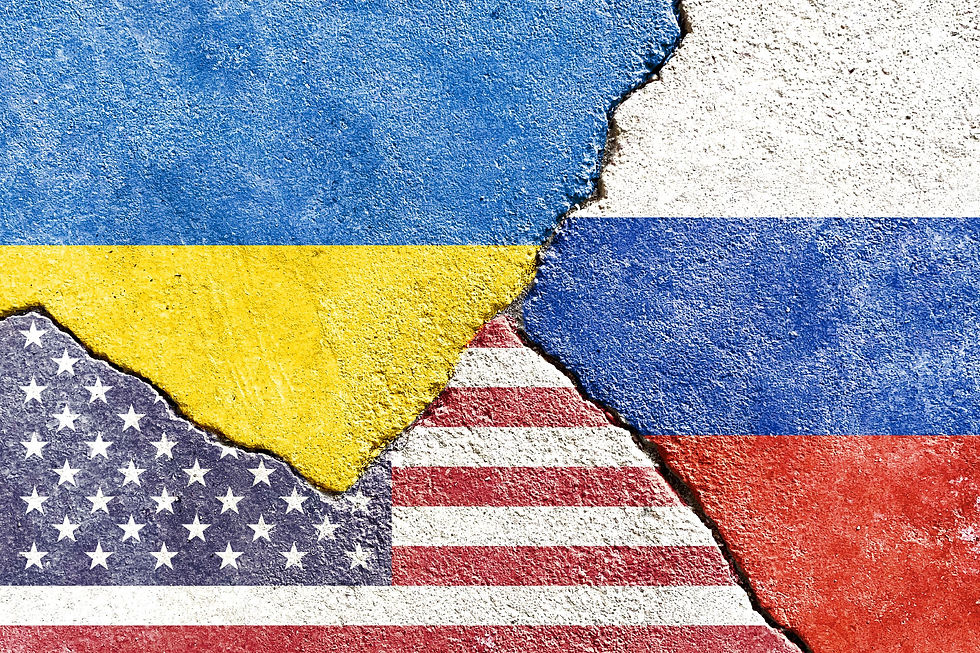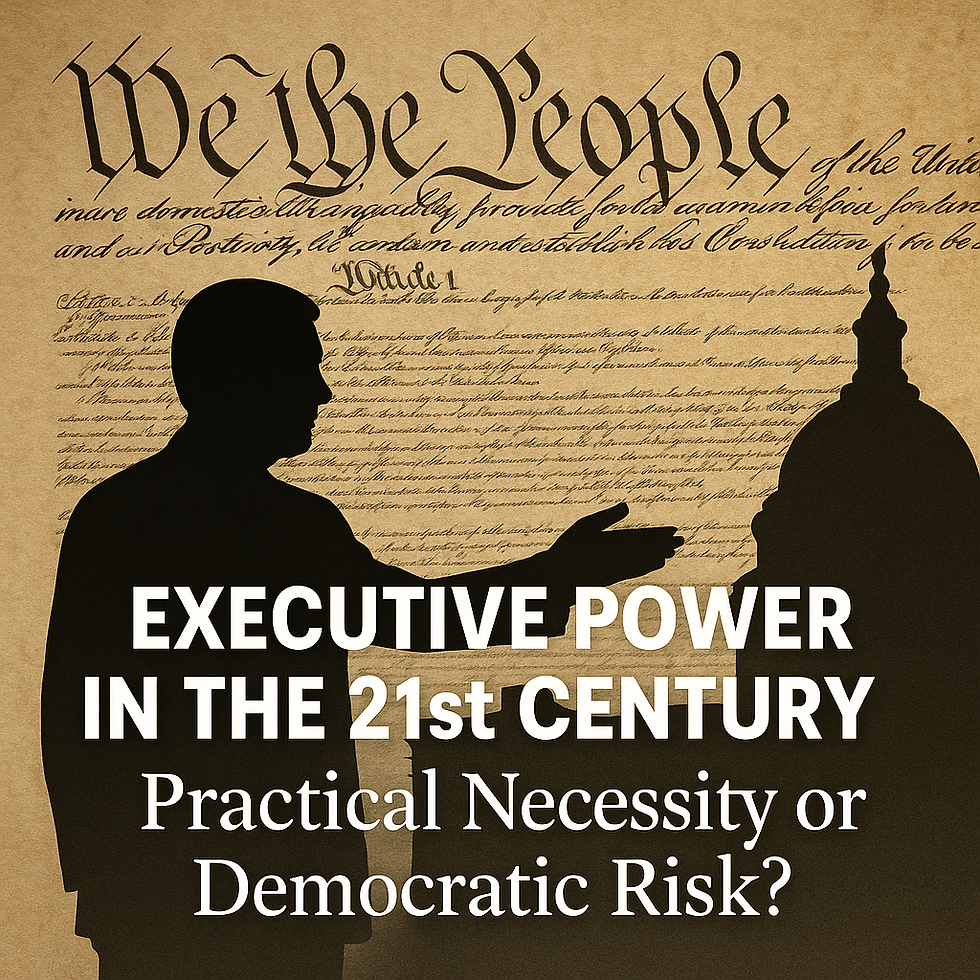America’s New Foreign Policy Dilemma: Can the U.S. Lead While Europe Steps Up?
- Dr. Johnson -UnTangled Talk

- Feb 23, 2025
- 5 min read
For decades, America has been the backbone of global security, carrying much of the weight for NATO and international stability. But as the world shifts, one question grows louder: Should Europe take the lead in its own defense?
The Trump administration is signaling a change—one that many conservatives and realists have long supported. With the U.S. contributing around 3.4% of its GDP to NATO while many European nations fall short of their agreed commitments, isn’t it time for Europe to step up? The answer seems obvious. But here’s the real challenge: How does the U.S. encourage Europe to take responsibility while still maintaining its leadership on the global stage?
Now, with new diplomatic shifts and strategic recalculations, we must ask: Are we witnessing a necessary correction in U.S. foreign policy, or could this be a strategic loss that weakens American influence in the long run?

Flashback to 2023: What We Saw Coming
In 2023, as the Russia-Ukraine war raged on, I wrote an analysis exploring what a Russian victory could mean for global power dynamics. At the time, the West was united in its support for Ukraine, with the U.S. leading the charge. But beneath the surface, cracks were forming.
One of the key concerns I raised in my essay was the long-term implications of a fractured Western alliance. If Russia were to solidify control over Ukrainian territory—whether through military success or diplomatic concessions—it wouldn’t just be a victory for Moscow. It would signal a failure of deterrence and raise serious questions about the ability of Western powers to uphold global norms.
But here’s the part that’s playing out right now: The U.S. can’t shoulder this burden alone. With NATO’s European members consistently underfunding their defense commitments, the weight of global security has largely rested on Washington’s shoulders. My analysis from 2023 questioned: What happens if the U.S. steps back and demands that Europe take on more responsibility? Does it strengthen the alliance—or weaken American leadership?
That question is no longer hypothetical. It’s happening now.
What’s Happening Now: A Shift in Global Strategy
Fast forward to today, and the shift I warned about in 2023 is becoming reality. The Trump administration is redefining America’s role in global security, calling for European nations to take more responsibility while focusing U.S. efforts elsewhere. The logic behind this is clear:
The U.S. contributes about 3.4% of GDP to NATO, significantly more than most European allies.
Many NATO countries fall short of their agreed defense spending commitments, despite years of promises to increase.
The U.S. cannot and should not carry the entire burden of defending Europe while also countering threats in the Indo-Pacific.
From a strategic standpoint, this shift makes sense. Europe has relied on American military support for decades, and Trump is demanding that Europe finally step up. But here’s the critical question: How does this affect U.S. leadership?
On one hand, a stronger European defense posture could free up U.S. resources, allowing Washington to focus on countering China’s growing influence in the Indo-Pacific. On the other hand, if the U.S. is perceived as stepping back too much, it creates a power vacuum—one that Russia and China are eager to fill.
This is where the balance becomes tricky. If Europe takes the lead in security, does that make NATO stronger—or does it signal to adversaries that the Western alliance is weakening? If the U.S. pulls back too far, does it give Russia and China an opportunity to reshape the global order on their own terms?
This is the moment of strategic recalibration. The question isn’t just about whether Europe should do more—it’s about how the U.S. can encourage Europe to take responsibility while still maintaining its role as a global leader.
Strategic Loss or Necessary Reset? The Stakes for U.S. Leadership
The push for Europe to take more responsibility is long overdue. But in the high-stakes game of global power, every move has consequences. The question isn’t just whether Europe should step up—it’s what happens to U.S. leadership when it does.
1. The Risk: A Power Vacuum That Russia and China Will Exploit
If the U.S. is seen as stepping back too far, it could weaken its influence over key allies and create openings for rivals. Russia and China thrive in uncertainty, and a fractured NATO could give them the leverage they need to shift the global balance of power.
Russia: A less U.S.-led NATO might embolden Russia to push its influence deeper into Eastern Europe. If European nations struggle to coordinate their own defense, Moscow could test their resolve—through military pressure, energy politics, or hybrid warfare tactics.
China: While Europe refocuses on defense, China is expanding its economic and military influence globally—particularly in Africa, Latin America, and the Indo-Pacific. A distracted West gives Beijing more room to reshape global trade and security structures on its own terms.
In this scenario, the U.S. would still be the world’s strongest power, but without the same ability to dictate global rules. Instead of being the decisive leader of the West, America might become just one of several competing great powers—losing the strategic advantage it has held since World War II.
2. The Opportunity: A Stronger, More Balanced Western Alliance
On the other hand, if this shift is managed correctly, it could actually strengthen the U.S.-Europe alliance. Instead of one nation carrying the burden, NATO would become a more self-reliant and capable force, better equipped to handle future threats.
A Europe that invests in its defense means a stronger NATO overall, giving the U.S. more flexibility to counter China while still maintaining transatlantic security.
A more balanced alliance could make NATO more politically resilient, preventing internal divisions over burden-sharing.
America as a “first among equals” rather than the sole enforcer of global order might create a more sustainable leadership model for the 21st century.
The key, however, is execution. If the U.S. shifts too abruptly, allies may turn to other powers for security guarantees. If Europe fails to step up, NATO’s credibility crumbles.
What’s Next? A Smart Strategy for U.S. Leadership
The challenge for America isn’t just stepping back—it’s stepping back the right way. If the goal is to get Europe to take more responsibility without weakening U.S. leadership, then Washington must be strategic, not reactionary.
Encourage European nations to increase their defense spending while ensuring coordination within NATO.
Keep the U.S. at the center of intelligence-sharing and diplomatic coordination.
Balance resources to contain Russia in Europe while countering China’s global ambitions.
Leading by Empowering
The world is changing. The days of the U.S. carrying NATO alone are over, but that doesn’t mean American leadership should fade. A well-managed shift can make the alliance stronger, ensuring that the U.S. remains the key global power without bearing the full cost alone. This isn’t a retreat. It’s a recalibration—one that, if done right, could position the U.S. as the guiding force behind a more self-reliant, unified West.
The question now is: Can America manage this shift without losing its leadership position? The answer depends on the next steps Washington takes.
[Share your thoughts]!



Comments